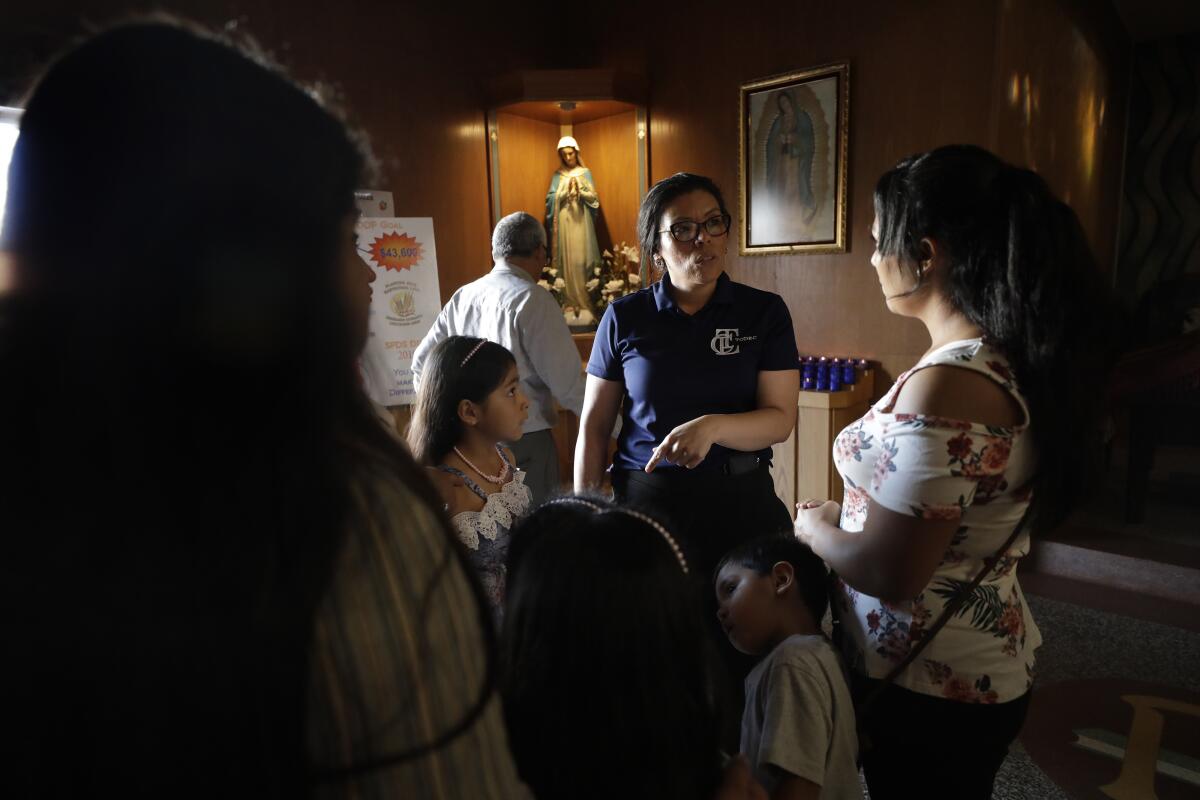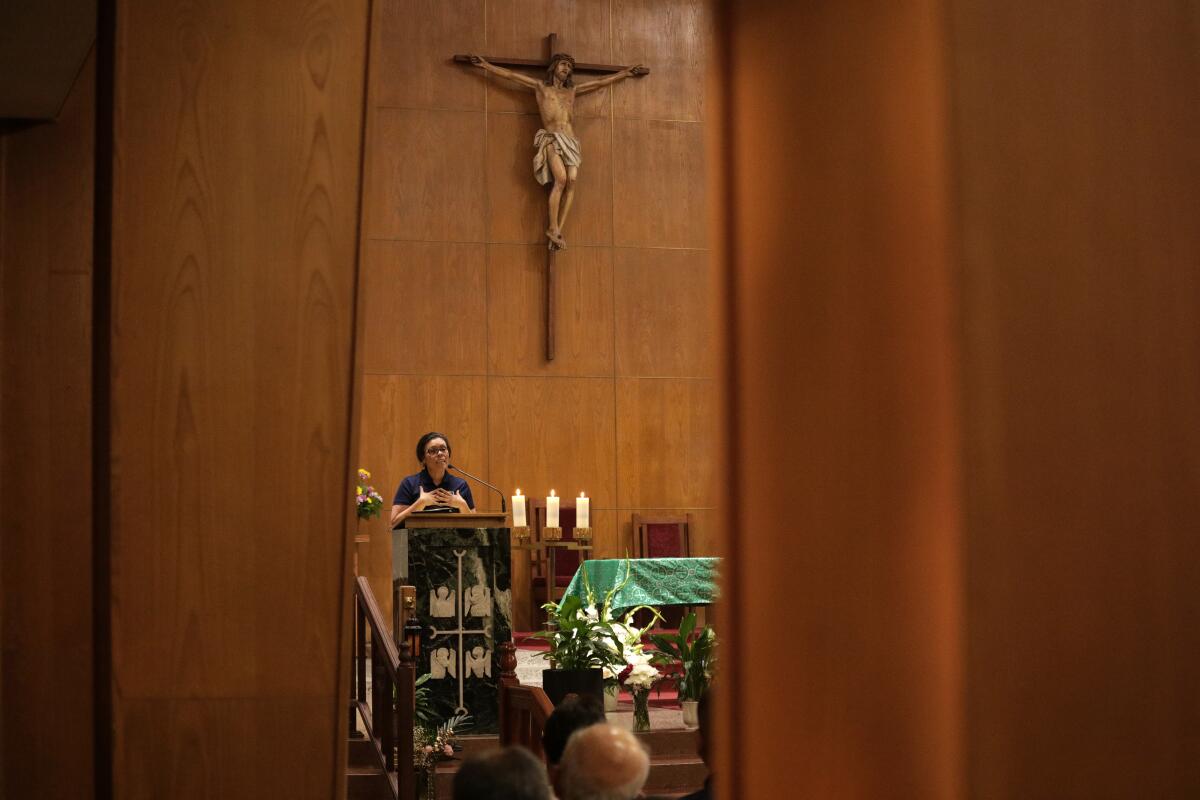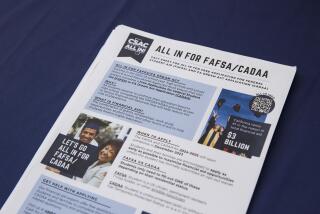Trump administration’s ‘public charge’ rule has chilling effect on benefits for immigrants’ children

- Share via
After a recent Sunday evening Mass, Luz Gallegos stepped up to the pulpit at St. Francis de Sales Catholic Church in Riverside to explain things and calm nerves.
Gallegos and her colleagues at the TODEC Legal Center, an immigrant services provider in nearby Perris, had been receiving questions from parents who were considering disenrolling their children from a range of public benefits.
They were reacting to the new “public charge” rule — published earlier this month — that could allow the federal government to deny green cards to immigrants who use Medicaid, food stamps, housing vouchers or other forms of public assistance, potentially making it harder for many to gain legal status in the United States.
Gallego told parishioners that the rule does not penalize an applicant for benefits received by a family member, such as a child who is a U.S. citizen.
But for Gallegos and others, convincing parents they don’t have to opt out of benefits for their children has felt like a monumental task at a time when family separations, the threat of raids and President Trump’s harsh rhetoric toward immigrants have created a deep sense of fear.
“People are terrified,” Gallegos said. “At the end of the day, they are going to do what they need to do to protect their families.”
Legal clinics have reported parents thinking about opting their children out of benefits that include services received at school, Medicaid, financial aid for college, and food stamps.
Federal law already requires people applying for green cards and legal status to prove they will not become a “public charge,” or a financial burden to the U.S. But the new rule, which will take effect in mid-October if it survives legal challenges from California and other states, outlines a broader range of programs that could disqualify an applicant. Officials will weigh public assistance along with other factors such as education, household income and health.
Medicaid received by children under age 21 won’t be considered. Nor will emergency medical assistance, school lunch programs, food pantries or disaster relief. Active U.S. military members are exempt, as are refugees or asylum seekers. The rule would also not be applied retroactively.
Some began pulling out of public programs last year when rumors about the rule first circulated. A December survey by the Urban Institute, a nonprofit research organization, reported that nearly 14% of 1,950 adults who were foreign-born or living with foreign-born family members have avoided participating in public benefit programs in the last year because they worried it would hurt their chance to gain green cards.

Experts say that people are likely to fall back on what feels like the safest option without fully being able to understand how the rule applies to them.
“We’re already seeing chilling effects,” said Sara McTarnaghan, a research associate at the Urban Institute. “There are families that are stopping benefits for their U.S. citizen children. There are green card holders and naturalized citizens that stopped benefits even though they won’t be affected.”
Kelly Whitener, an associate research professor at the Georgetown University Center for Children and Families, said families are exposed to greater financial instability when a member is uninsured, and that children, in particular, could suffer serious consequences if they lose their benefits.
“When children have health coverage, they are more likely to get the preventative care that they need, they are more likely to have better attendance at school, graduate from high school, go on to college, get higher-paying jobs,” she said.
Immigrants without legal status who spoke with the Times, requesting that only their first names be used out of fear of being deported, said they worried that they will be seen as a “public charge” because of the benefits their children receive.
Parents of children with disabilities who receive special services at school have removed or are considering removing them from school. Jhoana, who lives in Moreno Valley and is from Mexico’s Jalisco state, said parents like her now worry about signing a portion of an Individualized Education Plan, or IEP, that allows a school district to get Medi-Cal reimbursements for services a child receives.
When the rule was published, she decided to enroll her 16-year-old son, who has autism, in online classes. She plans on trying to teach herself how to give him the speech and occupational therapy he was offered at school.
As a single mother, her driving concern was the possibility of being separated from her son if she does not gain legal status.
“You give up important services for your children out of fear, but what’s worse is for your son not to be with you,” she said.
Maria, who lives in Perris and is from Mexico City, pulled her 15-year-old son, who has autism, out of school for the same reason. She didn’t ask the district for advice before doing so, not wanting to disclose that she was undocumented.
“There are some things you need to keep to yourself,” she said.
However, Valerie Vanaman, an attorney who represents children with disabilities, said that parents do not need to give consent to allow a school district to receive reimbursement for services their child receives.
“Smart districts will reach out to families and tell them that they can rescind [that] part of the IEP,” she said.
Miriam Nunez, a supervising attorney at the Central American Resource Center in Los Angeles, said her staff has seen confusion about what types of applicants are subject to the rule, which exempts those who qualify for humanitarian visas like the U visa for victims of crimes.
“We’re hearing that a U visa holder is afraid and they want to no longer receive medical or certain benefits for themselves or their children,” she said.
She said her staff is seeing an uptick in calls from people withdrawing their citizenship applications.
“We’ve explained how the rule doesn’t affect them ... but unfortunately, fear is greater than reason,” she said. “This is precisely the sort of effect I believe this rule change is intended to have, to confuse and dissuade eligible candidates from applying for residency or even citizenship.”
Luvia Quinones, the health policy director at the Illinois Coalition for Immigrant and Refugee Rights, also said her staff has received calls about refugees and asylum seekers disenrolling from Medicaid and food benefits even though they should not be affected.
“People are just overall afraid of accessing anything,” she said.
Citing pending litigation, a spokesperson for U.S. Citizenship and Immigration Services, said the agency could not comment on allegations that the rule has created confusion among parents. But the Trump administration has defended the rule.
“We certainly expect anyone of any income to stand on their own two feet,” Ken Cuccinelli, acting head of USCIS, said at a White House press briefing announcing the rule.
Jazmin Cerda, 26, a public benefits specialist at Brighton Park Neighborhood Council in Chicago, decided to opt out of benefits for her and her daughter in 2018 when the rule was still in its infancy.
Cerda feared that her and her then 3-year-old daughter’s medical benefits could hurt her application for citizenship. But her daughter needed surgery to remove a cyst that was causing an infection in her throat. Cerda thought she needed to make an impossible choice.
“It was the benefits for my daughter or my citizenship,” she said.
She decided to withdraw from her own medical benefits, as well as her daughter’s food stamps. Cerda took up face painting as a side job to afford rent and food.
Later, she was told by a lawyer that she wouldn’t have been subject to the rule because it does not apply to those seeking citizenship. Now, Cerda tries to connect people to low-cost attorneys when they ask her whether they should disenroll.
“I have lived the situation where you’re in panic,” she said.
At the church, Gallegos passed out fliers explaining the new rule. Belen, a Riverside resident from Mexico’s Guanajuato state, asked Gallegos if she should continue to receive food stamps for her four children.
After hearing Gallego’s advice, she said she would keep the benefits. The food stamps are vital, she said, since only her husband, a construction worker, is employed.
“It helps us a lot,” she said. “It’s food for my children. It’s not for me.”
Likewise, Alma, who came to the church with her three daughters, said she felt some relief when Gallegos told her that keeping her daughters on Medi-Cal would not jeopardize her case under the rule.
“The medical will be the last thing I take away from them,” she said.
But Alma still worries about relying too much on public benefits. She refuses to apply for food stamps for her daughters, preferring to rely on church pantries, even though she’s been told those benefits won’t affect her.
“We do need it, because you always need food,” she said. “If I saw the president say on TV this food for children won’t affect me, I might ask for it.”
More to Read
Sign up for Essential California
The most important California stories and recommendations in your inbox every morning.
You may occasionally receive promotional content from the Los Angeles Times.











